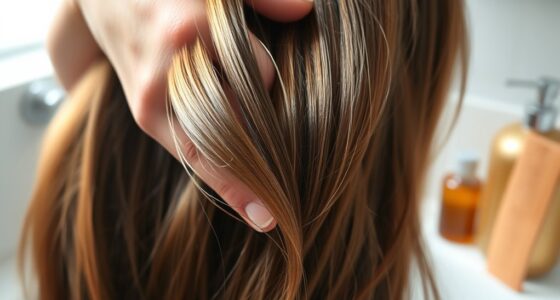To protect your hair from chlorine and saltwater damage, start by rinsing your hair with fresh water before swimming. Apply natural oils, like coconut or olive oil, to create a barrier against drying elements. Wearing a snug swim cap also helps reduce exposure. While swimming, braid your hair to minimize tangling and damage. After swimming, rinse your hair immediately with fresh water to remove harsh chemicals. Use a swimmer-friendly shampoo and condition deep to restore moisture. Regular hair maintenance and hydration are key to long-term health. There's much more you can do to keep your hair thriving during swim season.
Key Takeaways
- Rinse your hair with fresh water before swimming to minimize chlorine and salt absorption.
- Apply natural oils or leave-in conditioners to create a protective barrier against water damage.
- Wear a snug-fitting swim cap to further reduce exposure to chlorinated or salty water.
- Rinse your hair immediately after swimming to remove harmful chemicals and restore moisture.
- Incorporate deep conditioning treatments weekly to combat dryness and enhance hair hydration.
Understanding Chlorine Damage

When you swim in chlorinated water, it's essential to understand how chlorine can damage your hair. Chlorine strips your hair of its natural oils, leading to dryness and brittleness. This makes your hair more susceptible to breakage and split ends, especially if you have thin or chemically treated hair.
Regular skin treatments can help maintain overall health, which includes your hair's condition. If you have light-colored hair, you'll notice that frequent exposure often results in discoloration, and the combination of chlorine and copper in pool water can even give your locks a green tint.
Long-term exposure to chlorine can lead to cumulative damage, creating dryness, frizz, and tangles that are hard to manage. The risk intensifies for individuals with bleached or dry hair types, who need to take extra precautions to protect hair from chlorine.
To minimize the effects, consider using a moisturizing conditioner before and after your swim. This practice can help create a barrier, reducing chlorine's impact while keeping your hair hydrated.
Pre-Swim Hair Care Techniques
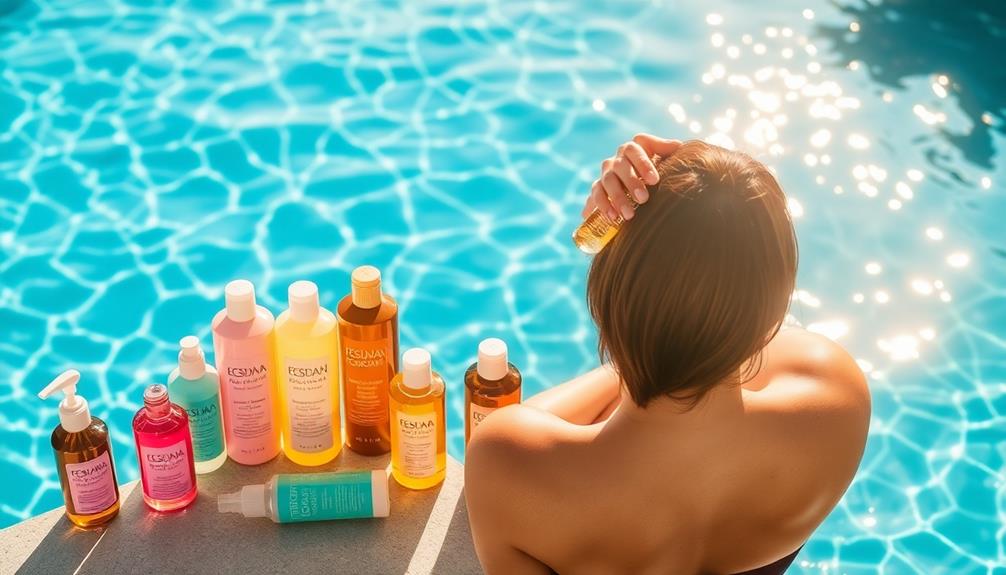
To guarantee your hair stays healthy while swimming, it's vital to adopt effective pre-swim care techniques. Start by rinsing your hair with fresh water before you plunge in. This simple step helps reduce chlorine absorption, acting as a barrier to protect your hair from damage.
Regular maintenance of your hair, similar to how you'd maintain an air purifier, can further enhance its health. Next, wet your hair thoroughly and apply natural oils like coconut or olive oil. These oils create a water-resistant layer, enhancing moisture retention and safeguarding your hair from harsh chemicals.
Don't forget to generously use a leave-in conditioner on damp hair. This adds an additional protective barrier against chlorine and saltwater. Wearing a swim cap is another important strategy; it dramatically minimizes exposure to both chlorinated and salty water, reducing the risk of damage during your swimming sessions.
Lastly, consider braiding your hair before swimming. Not only does this prevent tangling, but it also reduces the surface area exposed to damaging water, further helping to protect your hair when swimming.
Protective Measures While Swimming

While swimming, taking protective measures for your hair is crucial to prevent damage from chlorine and saltwater. Start by rinsing your hair thoroughly with fresh water before diving in. This saturates your strands and helps reduce chlorine absorption by acting as a barrier.
Additionally, using a protective leave-in conditioner or natural oils, like coconut or olive oil, can enhance your hair's resilience against harsh elements, similar to how proper diet and care are essential for pets like hamsters in their habitat ultimate hamster care guide.
Next, apply a protective leave-in conditioner or natural oils, like coconut or olive oil, to create a moisture-retaining layer that shields your hair from drying effects.
Wearing a snug-fitting swim cap can greatly minimize direct exposure to chlorinated pools or saltwater, protecting your hair from damage and tangling.
Additionally, braid your hair before swimming to limit its surface area exposure to water, which helps reduce tangling and hair breakage caused by movement in the water.
Opt for loose hairstyles rather than tight ones, as tension can lead to hair breakage, especially when your hair is wet and more fragile.
Post-Swim Rinse and Care
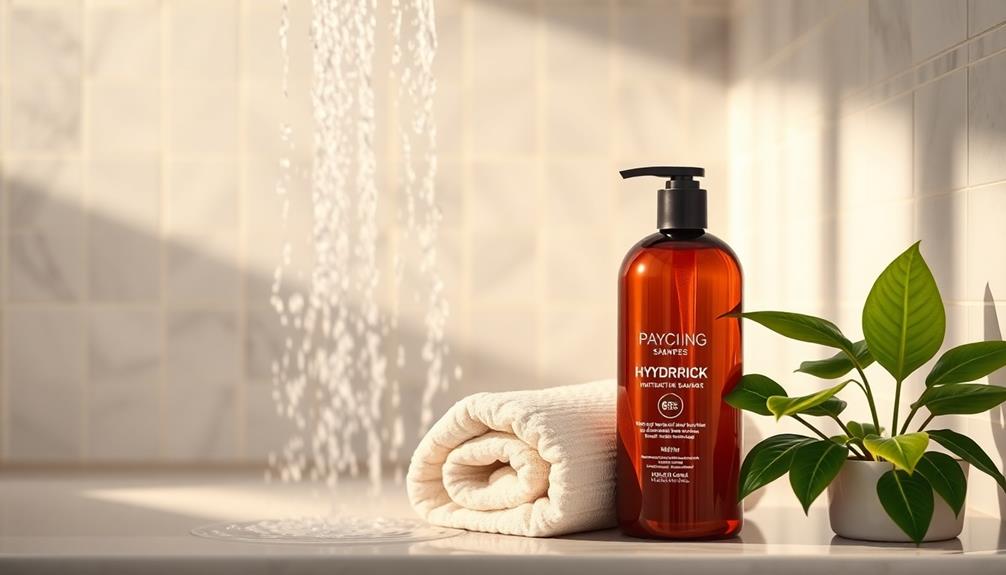
After you swim, rinse your hair with fresh water right away to wash off chlorine and salt. This initial rinse is essential for preventing damage to your hair's structure, similar to how a glycolic acid exfoliating toner prepares skin for better absorption of subsequent products.
Choosing a clarifying shampoo designed for swimmers can help remove any stubborn residues, but make sure to use it sparingly.
To really nourish your hair, follow up with a deep conditioning treatment that restores moisture and repairs damage.
Immediate Rinse Importance
Rinsing your hair immediately after swimming is vital for protecting it from chlorine and salt damage. By rinsing your hair thoroughly with clean water, you're taking an important step in maintaining hair health and preventing long-term issues.
Keeping your environment clean can also contribute to overall wellness, as a tidy space promotes better mental well-being and reduces stress levels health and wellness benefits.
Here's why the immediate rinse is so important:
- Removing Chlorine and Salt: A quick rinse helps wash away harmful chemicals before they settle into your hair, which can cause brittleness and dryness.
- Restoring Moisture Balance: Using cold, fresh water to rinse hair can help restore hydration, which is often stripped away by chlorine and saltwater.
- Establishing a Post-Swim Rinse Routine: Following up your rinse with a clarifying shampoo within 30 minutes guarantees that any remaining residues are eliminated, further preventing damage.
Incorporating this immediate rinse importance into your routine will greatly enhance your hair's resilience against the harsh effects of swimming.
Effective Shampoo Selection
Choosing the right shampoo is essential to effectively caring for your hair after swimming. Start by selecting shampoos specifically designed for swimmers, which often contain phytic acid and rice protein. These ingredients help remove chlorine water and salt while maintaining moisture balance in your hair.
When it comes to effective shampoo selection, consider the following options:
| Shampoo Type | Benefits | Usage Tips |
|---|---|---|
| Clarifying Shampoos | Eliminates chlorine buildup | Use post-swim, max once a week |
| Sulfate-Free Shampoos | Gentle on hair, prevents dryness | Ideal for frequent use |
| Hydrating Conditioners | Provides UV protection, keeps hair moisturized | Always follow shampooing |
After shampooing, don't forget to apply a deep conditioning mask enriched with ingredients like aloe vera or coconut oil. This enhances your post-swim care routine and helps repair damage. If you wear a swimming cap, it can further protect your hair, but using the right shampoo is vital to combat any residual chlorine or salt. Remember these hair care tips for maintaining healthy hair in the water!
Deep Conditioning Treatment
To protect your hair from the damaging effects of chlorine and salt, it's essential to incorporate a deep conditioning treatment into your post-swim routine.
After rinsing your hair with fresh water, follow these steps to guarantee your hair strands stay hydrated and healthy:
1. Clarifying Shampoo: Use a clarifying shampoo once a week to effectively cleanse your hair of chlorine buildup and impurities without stripping too much moisture.
This is especially important as chlorine and salt can lead to dryness and brittleness, making it critical to restore your hair's natural moisture balance.
2. Deep Conditioning Treatment: Apply a deep conditioning treatment or hydrating hair mask at least once a week.
Look for conditioners that contain ingredients like shea butter, coconut oil, or aloe vera to restore hydration and improve hair texture.
You might also consider adding essential oils known for their moisturizing properties, such as tea tree oil's antimicrobial benefits, to enhance the effectiveness of your treatment.
3. Leave-In Conditioners: After your deep conditioning treatment, use a leave-in conditioner or hair oil to maintain moisture levels.
This adds an extra layer of protection against environmental factors, especially after swimming.
Choosing the Right Products
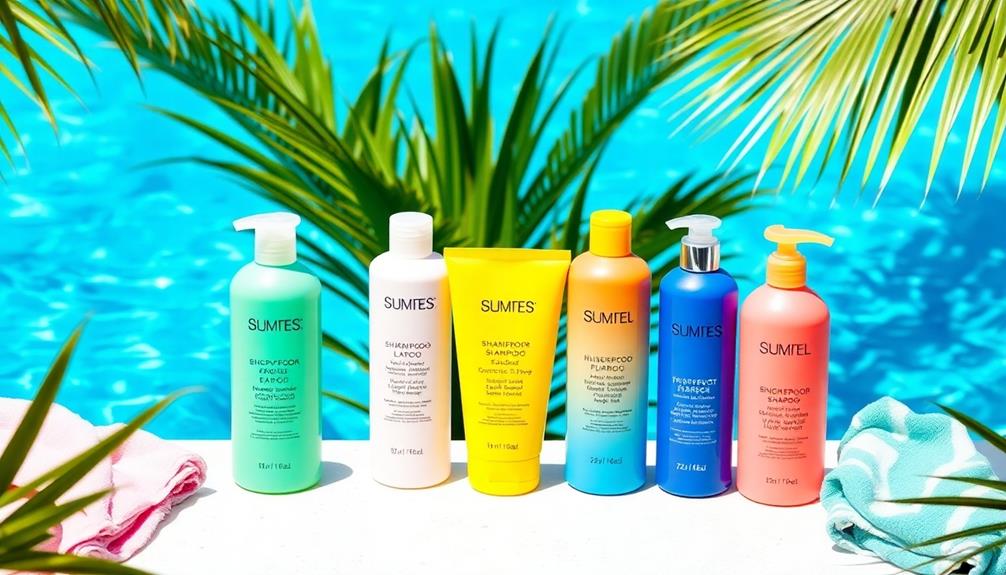
When it comes to protecting your hair while swimming, selecting the right products is essential for maintaining its health and shine. Start with a swim cap to minimize chlorine exposure, but even with that, you'll want to use swimmer-specific shampoo and conditioner.
Incorporating a mindset to attract abundance can also enhance your overall self-care routine, making it easier to prioritize your hair health. Look for options like Babo Botanicals Swim & Sport Citrus Mint Shampoo, which effectively removes chlorine and hydrates your hair without harsh chemicals.
Choose sulfate-free shampoos to avoid stripping your hair of its natural oils, which are already compromised by chlorine. For your conditioner, opt for moisturizing ingredients like dimethicone, which coats hair strands, providing an extra barrier against damage while enhancing shine.
Incorporate a leave-in conditioner with UV protection to safeguard your hair from sun damage during outdoor swims. Natural oils, such as coconut or olive oil, can also work wonders. They create a water-resistant barrier against chlorine and saltwater, offering extra hydration and protection.
Hydration and Nutrition for Hair

To keep your hair looking its best while swimming, hydration is key. Drinking enough water not only helps maintain moisture but also prevents dryness and brittleness.
Incorporating nutrient-rich foods into your diet can further enhance hair health and resilience against chlorine and saltwater damage. Pair that with nutrient-rich foods, and you'll support your hair's health from the inside out.
Importance of Hydration
Staying hydrated is essential for maintaining healthy hair, especially for those who spend time swimming. When you're frequently exposed to chlorine and saltwater, proper hydration helps keep your hair's moisture levels in check, preventing dryness and brittleness.
Additionally, consuming hydrating foods like fruits and vegetables can further support your hair health, as many contain vitamins and antioxidants that combat damage, similar to how celery juice and pregnancy can benefit overall health.
Here are three key reasons why hydration matters:
- Promotes Texture and Shine: Drinking plenty of water helps maintain moisture levels in your hair, enhancing its overall texture and shine.
- Supports Hair Health: Consuming a balanced diet rich in vitamins A, C, and E, along with omega-3 fatty acids, is critical for stronger, healthier hair. These nutrients work together to fortify your hair from within.
- Prevents Damage: Adequate hydration from both water and fruits can greatly reduce the risk of dryness and brittleness, keeping your hair resilient against environmental factors.
Incorporating these hydration tips into your routine not only benefits your hair but also contributes to your overall well-being.
Nutrient-Rich Food Choices
Incorporating nutrient-rich foods into your diet is fundamental for maintaining healthy hair, especially for swimmers. Focus on including omega-3 fatty acids found in fish like salmon and walnuts, as they enhance hair strength and promote a healthy scalp, contributing to overall hair vitality.
Additionally, consider incorporating low carb high protein breakfast ideas to guarantee you're fueling your body effectively for both swimming and hair health.
You'll also want to load up on foods rich in vitamins A, C, and E—think sweet potatoes, oranges, and spinach. These vitamins support hair growth and help maintain your hair's natural moisture levels.
Don't forget about protein-rich foods like eggs, Greek yogurt, and legumes; they're essential for building keratin, the main structural protein in hair, promoting stronger and healthier strands.
Hydration plays a key role too. Make certain you're drinking at least eight glasses of water daily to keep your hair moisturized and prevent brittleness from dehydration.
Finally, include biotin-rich foods like almonds and avocados in your meals, as biotin is known for boosting hair health by promoting growth and reducing hair loss.
Regular Hair Maintenance
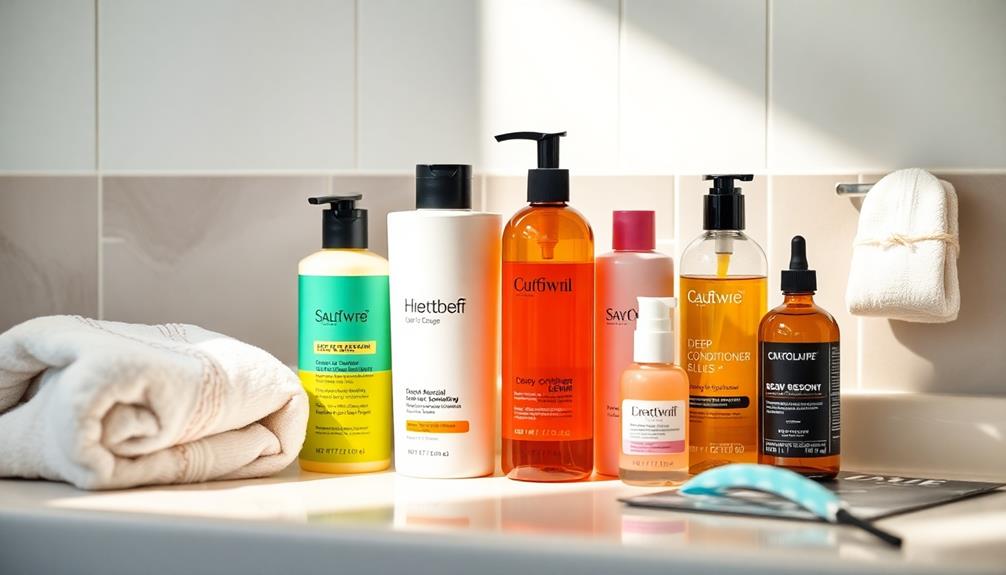
Regular hair maintenance is essential for anyone who swims frequently, as exposure to chlorine and saltwater can wreak havoc on your locks. To keep your hair healthy and vibrant during the swimming season, follow these key practices:
- Schedule regular haircuts every six weeks. This helps eliminate split ends and promotes healthier hair growth, especially if you're often exposed to chlorine or saltwater.
- Incorporate deep conditioning treatments into your routine at least once a week. These treatments replenish moisture and repair damage caused by swimming.
- Use specialized products, like hydrating shampoos and conditioners, designed to remove chlorine buildup and maintain hair health after your swim sessions.
In addition to these practices, monitor your hair for signs of damage, such as dryness and brittleness. Adjust your care routine promptly to address any issues.
Consistently using natural oils or leave-in conditioners provides ongoing protection against the damaging effects of chlorine and saltwater. By prioritizing these steps, you can effectively maintain your hair health and enjoy your time in the water without worrying about hair damage.
Repairing Chlorine-Damaged Hair
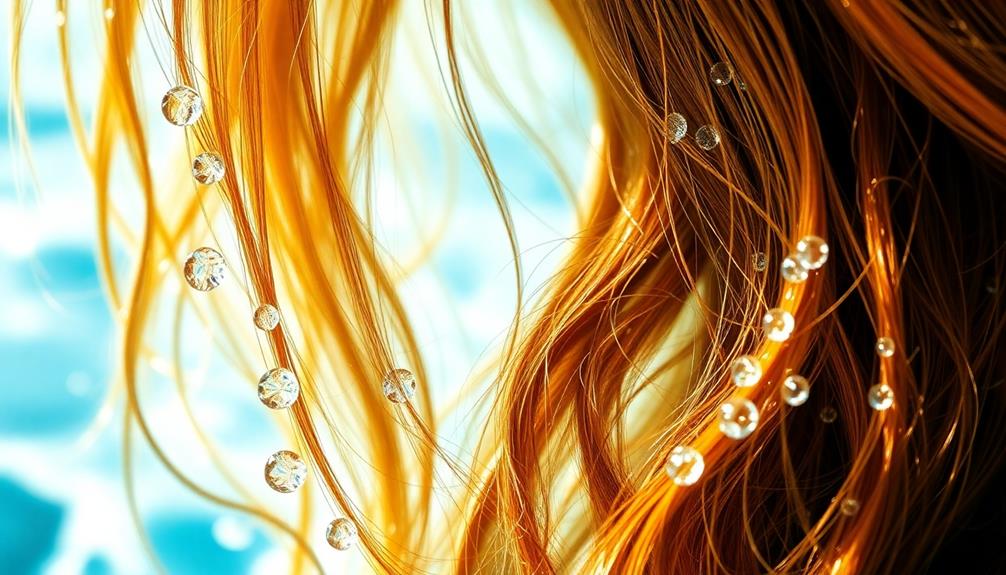
Chlorine-damaged hair often feels dry and looks frizzy, making it crucial to take immediate action to restore its health. Start by using a clarifying shampoo after swimming to remove chlorine buildup, but do this sparingly to avoid further drying out your hair. This initial step helps clear away impurities, setting the stage for effective treatments.
Next, incorporate deep conditioning treatments into your routine at least twice a week. These treatments are essential for replenishing moisture and repairing damage caused by chlorine exposure. Look for products that focus on hydration to help revive your hair's natural texture.
Additionally, consider adding natural oils like coconut or argan oil to your hair care arsenal. These oils provide important hydration and act as a protective barrier against further damage. They're perfect for sealing moisture in and preventing dryness.
Don't forget about regular trims every six weeks to eliminate split ends. This simple step can prevent the progression of damage from chlorine, promoting healthier hair growth overall.
With consistent care, you can effectively restore your chlorine-damaged hair to its former glory.
Professional Treatments and Advice
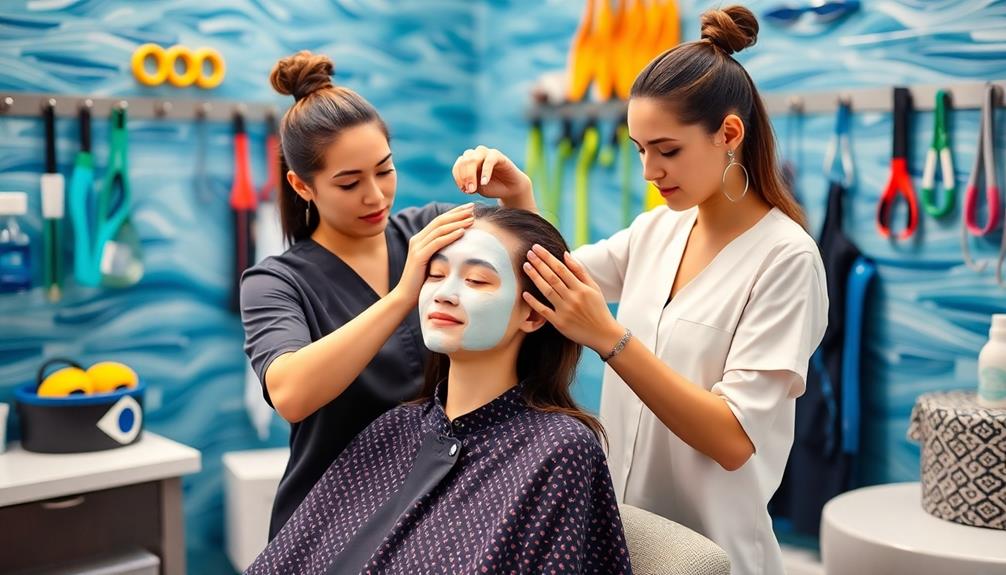
After taking steps to repair chlorine-damaged hair, you might wonder what professional options are available to further enhance your hair's health. Here are three effective treatments and strategies to contemplate:
- Deep Conditioning Sessions: Professional stylists often recommend deep conditioning treatments designed specifically for swimmers. These sessions restore moisture and repair damage caused by chlorine and saltwater.
- Regular Trims: Scheduling salon visits every six weeks helps eliminate split ends and maintains your hair's overall health, especially after regular exposure to pool chemicals and ocean salt.
- Personalized Advice: Consulting with a hair care professional allows you to receive tailored advice specific to your hair type and the unique damage you've experienced from swimming.
Additionally, using professional-grade products like clarifying shampoos and moisturizing conditioners can greatly improve your hair's resilience.
These products are formulated to combat the drying effects of chlorine while ensuring hydration.
Frequently Asked Questions
How Do You Protect Your Hair From Chlorine and Salt Water?
To protect your hair from chlorine and saltwater, rinse it with fresh water before swimming, apply natural oils, wear a swim cap, and rinse immediately after swimming to minimize damage and maintain moisture.
Which Is Worse for Your Hair, Saltwater or Chlorine?
Imagine your hair as a delicate flower; chlorine's like a harsh storm, stripping away its beauty, while saltwater's a gentle breeze, leaving it parched but intact. Ultimately, chlorine's the real villain in this hair saga.
How Do You Prevent Salt Water Damage in Your Hair?
To prevent saltwater damage in your hair, rinse it with fresh water before swimming. Apply natural oils for protection, use a leave-in conditioner, and always rinse immediately after swimming to remove salt and hydrate.
How to Protect Yourself From Chlorine in a Swimming Pool?
Some believe chlorine's effects are inevitable, but you can protect yourself. Rinse off before swimming, use a protective barrier like a leave-in conditioner, and always shower after to wash away chlorine's harsh effects.
Conclusion
By following these tips, you can keep your hair looking vibrant and healthy, even after a swim. Think of your hair as a delicate flower; with the right care, it can flourish despite the challenges of chlorine and saltwater. Remember, a little prevention goes a long way, so take the time to protect and nourish your strands. Embrace your swim time with confidence, knowing your hair is shielded and ready to shine.




